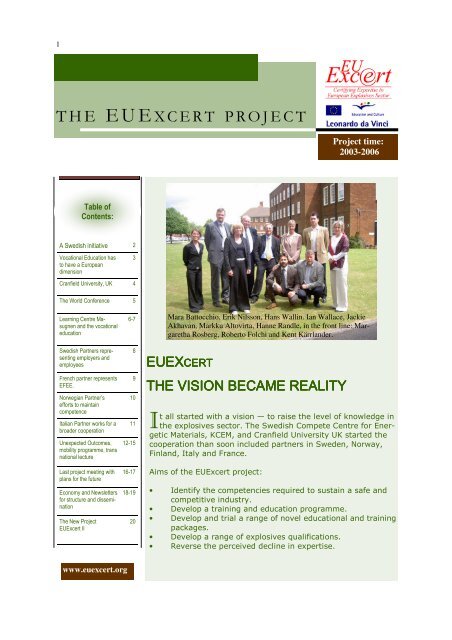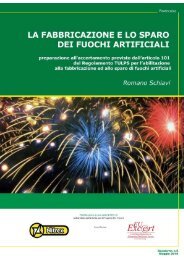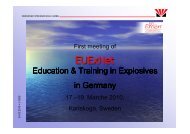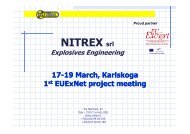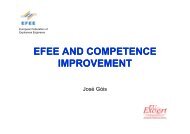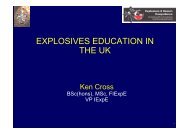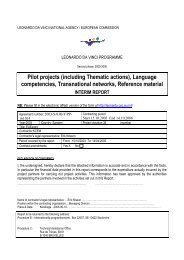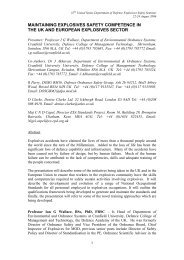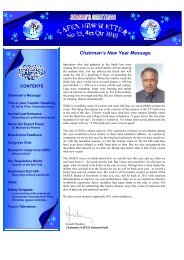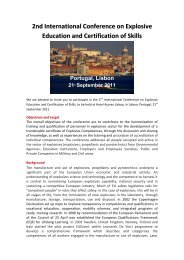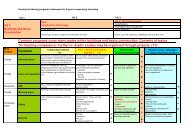A Historical Review - EU-Excert
A Historical Review - EU-Excert
A Historical Review - EU-Excert
You also want an ePaper? Increase the reach of your titles
YUMPU automatically turns print PDFs into web optimized ePapers that Google loves.
1<br />
T H E E U E X C E R T P R O J E C T<br />
Project time:<br />
2003-2006<br />
Table of<br />
Contents:<br />
A Swedish initiative 2<br />
Vocational Education has<br />
to have a European<br />
dimension<br />
3<br />
Cranfield University, UK 4<br />
The World Conference 5<br />
Learning Centre Masugnen<br />
and the vocational<br />
education<br />
Swedish Partners representing<br />
employers and<br />
employees<br />
French partner represents<br />
EFEE.<br />
Norwegian Partner’s<br />
efforts to maintain<br />
competence<br />
Italian Partner works for a<br />
broader cooperation<br />
Unexpected Outcomes,<br />
mobility programme, trans<br />
national lecture<br />
Last project meeting with<br />
plans for the future<br />
Economy and Newsletters<br />
for structure and dissemination<br />
The New Project<br />
<strong>EU</strong><strong>Excert</strong> II<br />
6-7<br />
8<br />
9<br />
10<br />
11<br />
12-15<br />
16-17<br />
18-19<br />
20<br />
<strong>EU</strong>EX<br />
Mara Battocchio, Erik Nilsson, Hans Wallin. Ian Wallace, Jackie<br />
Akhavan, Markku Altovirta, Hanne Randle, in the front line: Margaretha<br />
Rosberg, Roberto Folchi and Kent Kärrlander.<br />
<strong>EU</strong>EXCERT<br />
THE VISION BECAME REALITY<br />
t all started with a vision — to raise the level of knowledge in<br />
I the explosives sector. The Swedish Compete Centre for Energetic<br />
Materials, KCEM, and Cranfield University UK started the<br />
cooperation than soon included partners in Sweden, Norway,<br />
Finland, Italy and France.<br />
Aims of the <strong>EU</strong><strong>Excert</strong> project:<br />
• Identify the competencies required to sustain a safe and<br />
competitive industry.<br />
• Develop a training and education programme.<br />
• Develop and trial a range of novel educational and training<br />
packages.<br />
• Develop a range of explosives qualifications.<br />
• Reverse the perceived decline in expertise.<br />
www.euexcert.org
2<br />
Initiated by the Swedish Competence Centre<br />
he explosives sector has faced major<br />
T changes and will continue to do so, concerning<br />
structural and personnel matters.<br />
SWEDEN<br />
Erik Nilsson, Managing Director at KCEM, previous<br />
Chief Inspector of the National Inspectorate<br />
of Explosives, is the chairman of the <strong>EU</strong><strong>Excert</strong><br />
project.<br />
He ensures that countries, even outside the<br />
European Union, are aware of the work conducted<br />
in the project.<br />
Mr. Erik Nilsson, Chairman of the<br />
<strong>EU</strong><strong>Excert</strong> project.<br />
- It is important that we reach a European Standard for workers in the explosives business.<br />
Educational material needs to be the same across Europe, and personnel need to<br />
be trained with skills that can be transferable between countries.<br />
Industries are trans national, and that is why vocational education must be at a European<br />
level, according to Erik Nilsson.<br />
- The Loss of Competencies Must be Stopped<br />
s a result of the project, reference groups<br />
A have been established in some of the countries.<br />
But now is the time to publicise these issues,<br />
says Hans Wallin from the Swedish KCEM.<br />
The Italians have produced educational material.<br />
The material includes both practical and theoretical<br />
parts.<br />
Even Swedish educational material is of interest<br />
to the project. Hans Wallin points out the importance<br />
of relevant and updated educational material<br />
in Europe.<br />
Mr. Hans Wallin, the Project Leader.<br />
- The different languages in Europe can be a problem. If the educational material is produced<br />
in English this could be translated into different languages. This would reduce<br />
costs and bring the educations to a European standard.<br />
In the end it is all about safety throughout Europe.<br />
- Our mission is to reduce accidents and be competitive.<br />
Today, industries are facing loss of competencies because qualified and experienced<br />
workers are close to retirement.
3<br />
MAIN OBJECTIVES IN THE PROJECT<br />
INVESTIGATE THE NEED<br />
FOR<br />
A GLOSSARY<br />
DEVELOP A TRAINING AND<br />
EDUCATION PROGRAMME<br />
CREATE A <strong>EU</strong>ROPEAN<br />
NETWORK<br />
IDENTIFY<br />
COMPETENCY NEEDS<br />
IN THE<br />
EXPLOSIVES SECTOR<br />
DEVELOP A RANGE OF<br />
EXPLOSIVE<br />
QUALIFICATIONS<br />
DEVELOP A<br />
COMPETENCY<br />
FRAMEWORK<br />
EXCHANGE<br />
PROGRAMME<br />
FOR STUDENTS<br />
ESTABLISH<br />
REFERENCE GROUPS<br />
IN THE PARTICIPATING<br />
COUNTRIES<br />
DEVELOP A PLAN<br />
FOR<br />
MOBILITY PROJECTS<br />
The Vocational Education has to have<br />
a European Dimension<br />
he explosive sector cooperates on a trans national basis throughout Europe and the<br />
T rest of the world. Membership in the European Union brings new opportunities to a<br />
broad audience and strengthens companies’ competitiveness.<br />
The advantages of vocational education would increase if it has a European dimension.<br />
Through cooperation and by building a trans national network, we can produce first<br />
class vocational education material, using modern technology.<br />
If competence skills are well defined in the field of explosives, vocational education<br />
would be a good basis for a common European education.<br />
There is a need for joint values and terminology across language barriers.<br />
Through the <strong>EU</strong><strong>Excert</strong> project, there will be opportunities for a European certificate for<br />
specialists in the explosives sector. This certificate will be based on experience and<br />
competence. First class educational material and methods for work place based education<br />
will we give employees an opportunity increases their competence through continuous<br />
development.
4<br />
BRITAIN<br />
- The Situation is a Nightmare, Professor says<br />
ranfield University is a unique university, working synchronised with the Defence<br />
C Academy of UK.<br />
Partners in the <strong>EU</strong><strong>Excert</strong> project represent trade unions, explosive industries, universities,<br />
consultants and organisations for vocational training and authorities. Cranfield University<br />
has had the responsibility for reporting to <strong>EU</strong><strong>Excert</strong> the UK national occupational<br />
standards and qualification framework in the UK explosive business.<br />
Professor Ian Wallace describes the situation in the explosives sector as “a nightmare”.<br />
But if the project succeeds in delivering European occupational<br />
standards and certification, it would improve safety in the explosives<br />
sector.<br />
If a person’s skills could be recognized everywhere in Europe,<br />
with the award of European certificates, people will be free to<br />
move within Europe.<br />
Professor Ian Wallace,<br />
Cranfield University UK<br />
Professor Wallace has been in the explosives business for 40<br />
years, and has an interest in the area of safety.<br />
100 incidents are reported in the explosive sector every year and major accident occurs<br />
every 10 years. Professor Ian Wallace gives some examples: Holland (1944): 42 died<br />
of a Conger Weapon System. US Carrier: 220 dead, 780 injured. Enschede (2000):<br />
20 people died. Black Horse Camp, DOHA, (1991): 2 dead, 53 vehicles destroyed.<br />
Xinjang, China, vehicle on bumpy road causes a blast, 60 dead. Accidents have also<br />
occurred in Denmark, UK, US, Brazil, Zambia, Afghanistan etc, etc ...<br />
To reduce the risks of accidents, Professor Wallace suggests:<br />
1. Increase legislation to provide a comprehensive framework that requires competent<br />
people.<br />
2. Improve standards in test and evaluation, buildings and facilities, and perhaps even<br />
people.<br />
We need competent explosives workers in the <strong>EU</strong> to be safe and competitive. We also<br />
need to address the loss of expertise by:<br />
• defining competence<br />
• provision of appropriate training and education<br />
• reducing barriers to mobility.<br />
NVQ Launch<br />
The group in the picture contains<br />
members of the UK reference<br />
group that participated in a<br />
launch ceremony for UK competencies<br />
in explosive substances<br />
and articles. The event took place<br />
at the Old Royal Naval College,<br />
Greenwich on the 16th of May<br />
2006.
5<br />
WORLD CONFERENCE<br />
The World Conference — a Success<br />
ne of the project’s aims is to organise conferences. The symposium Education<br />
O and Training in Explosives was held at the Defence College of Management and<br />
Technology in June 2005. Delegates came from all over the world: Canada, US, Australia,<br />
Sweden, Norway, Britain etc, and shared the<br />
same problems: majority of experienced employees<br />
are soon to retire.<br />
The theme for the symposium was the <strong>EU</strong><strong>Excert</strong><br />
project and how to ensure expertise in the future<br />
could be sustained.<br />
The <strong>EU</strong><strong>Excert</strong> project is looking into the structure<br />
of ECDL, The European Computer Driving License,<br />
which was partly funded by the Leonardo<br />
da Vinci project office.<br />
The participants were interested in a<br />
follow-up of the conference.<br />
Pete Bayley from the British Computer Society<br />
gave an interesting lecture at the conference,<br />
where he pointed out the importance of getting involved with like minded people. This is<br />
the key to success.<br />
- When we started with ECDL, we only had an idea, a logotype and a set of questions,<br />
Pete Bayley said. Those people who saw the potential in this project, offered the rest.<br />
- If you can get the license into policy documents, everyone else will want it, too. But<br />
you need to convince people.<br />
Would there be a possibility to create a certificate for handling explosives?<br />
The work will continue in the <strong>EU</strong><strong>Excert</strong> project.<br />
Dr. Jackie Akhavan, Cranfield University is happy with the conference.<br />
- We have had a lot of positive response. It has been marvellous!<br />
Theme for Next World Symposium<br />
his symposium will examine the development of a range<br />
T of explosive competencies and qualifications in research,<br />
design and development, safety management, test<br />
and evaluation, manufacture, maintenance, procurement,<br />
storage, transport, and disposal.<br />
Current and future requirements will be presented together<br />
with flexible training approaches to meet these needs.<br />
In addition, the setting up of a Foundation will be discussed<br />
with a view to award a European Explosives Certificate.<br />
The second<br />
symposium on<br />
Education &<br />
Training<br />
in Explosives<br />
13 – 15 June 2007<br />
at the Defence Academy,<br />
Shrivenham, UK
6<br />
he Swedish Learning Centre Masugnen shall support the <strong>EU</strong><strong>Excert</strong><br />
T project with expertise from experiences gained from workplace based<br />
distance education for the explosives sector.<br />
SWEDEN<br />
Learning Centre Masugnen for Flexible Learning<br />
Gisela Spak represents<br />
Masugnen.<br />
The education, KY (Kvalificerad Yrkesutbildning), in English: Qualified<br />
Vocational Education and Training for technicians/engineers in<br />
companies that deal with explosives and flammable matter is carried<br />
out with the modern support of e-learning.<br />
Learning Centre Masugnen<br />
- is a place for each person in the municipality where new methods<br />
are used in learning activities by using new technology<br />
- coordinates and organises competence development at different<br />
levels<br />
- supplies flexible, demand-led learning, adapted to specific needs<br />
by focusing on active knowledge searching methods.<br />
Work Place Based Education for Life Long Learning<br />
O n the 21st of June 2006 14 new students were saluted when receiving the certificate,<br />
achieved according to and with the Trade Association guidelines and issued<br />
by KCEM (Competence Centre for Energetic Material) on assignment of CI (Commission<br />
of Industries).<br />
KY within the explosives sector started 4 years ago by initiative from the authorities,<br />
Learning Centre Masugnen in Lindesberg, companies, organisations and unions in the<br />
explosives business.<br />
The flexibility of this method of education on site does not only mean greater freedom in<br />
time and place, but also in the pace of studies and content. This flexible way of working<br />
contains the adequate element of modern methods that exist and that are needed to<br />
pursue distant education. The education takes place on site or in the nearby vicinity.<br />
This method means that the theoretical education is<br />
sandwiched with practical education at workplaces; workplace<br />
based learning.<br />
This type of work place based education combined with<br />
distance education also enable reskilling the employed,<br />
and encourage life long learning. It is a sustainable<br />
method for the companies and the employees in the explosives<br />
sector to ensure their competitiveness.<br />
The facilitators have an important role in this qualified<br />
work place based education, and efforts are made to develop<br />
the Learning Centres continuation courses for the<br />
facilitators.<br />
The student Åsa Klaw assisted by<br />
Åke Eriksson, Bofors TestCenter.<br />
The trans national cooperation is also important. A mobility<br />
project has been approved sending students to England,<br />
and thanks to the <strong>EU</strong><strong>Excert</strong> project, contact has<br />
been established between Cranfield University UK and<br />
Learning Centre Masugnen Sweden.
7<br />
SWEDEN<br />
A Facilitator must be Supportive and Reflective<br />
irst of all, it is important to plan and inform the students, Åke<br />
F Eriksson says. He is the facilitator at Bofors Test Centre in<br />
Karlskoga, Sweden. Åke has valuable experience from the industry<br />
where he has worked for more than 30 years. Åke Eriksson<br />
has chosen some instructors for the students at the different departments,<br />
which is a kind of mentorship to support the students.<br />
- It is important for the students to have relevant background for<br />
this education, Åke Eriksson says.<br />
Åke plans the first period of the vocational training, and after the<br />
students have experienced the departments, they have a choice<br />
where to continue their further workplace training.<br />
A facilitator in the Qualified Vocational Training programme for Technicians handling<br />
pyrotechnical material in the explosives sector has the following tasks:<br />
• Be the representative for the company and the education.<br />
• Along with the educator plan for the student’s vocational training.<br />
• Be responsible for showing and instructing the student at the workplace.<br />
• Support and together with the student continuously organize, adjust and document the student’s<br />
workplace learning.<br />
• Be a link between the educator, the student and the company.<br />
• Spread the thoughts about workplace learning among the staff.<br />
• Work for a learning environment at the company.<br />
• Reflect with the student.<br />
- Be Prepared to Broaden your Knowledge<br />
- It is important that the<br />
students feel comfortable<br />
in the group, Åke<br />
Eriksson says. He always<br />
invites the students<br />
to meetings etc.<br />
o study as an adult is something completely different from studying in the traditional<br />
school system. Gunilla Wikström in Karlskoga, Sweden, was 40 years old<br />
T<br />
when she began studying at Learning Centre Masugnen<br />
in Lindesberg. She has never studied at a distance<br />
course before, and appreciates the flexibility to study<br />
when it suits her best. It is indeed a privilege.<br />
Gunilla Wikström is technically interested and is very<br />
satisfied with the Qualified Vocational Training programme<br />
for Technicians handling pyrotechnical material<br />
in the explosives sector. The training is available at several<br />
companies, and the students can use mini learning<br />
centres with computers. The theoretical parts are based<br />
on skills which the industry demands.<br />
Gunilla Wikström at Saab Bofors<br />
Dynamics, where the facilitator Lea<br />
Mattsson works.<br />
Gunilla Wikström has previously been unemployed and she is happy to get the opportunity<br />
to learn about working in the explosives industry. Gunilla is keen to continue further<br />
studies in the future.<br />
- You have to be prepared to broaden your knowledge, Gunilla says. There is so much<br />
happening in the world, so you have to accept the fact that you constantly need to develop<br />
your competencies.
8<br />
Swedish Employers Represented in <strong>EU</strong><strong>Excert</strong><br />
e can see many differences in the partners’ problems, but there<br />
W are also some similarities, Margaretha Rosberg says. She<br />
represents both YFIND, which is a collaboration between employers’<br />
and employees’ organisations with focus on educational and competence<br />
matters and the Swedish Industrial and Chemical Employers<br />
Association — Industri och KemiGruppen—which is an employer organisation<br />
within industrial business.<br />
A large number of retirements are expected within 10 years, and the<br />
industry will suffer a huge loss of competence that has to be replaced.<br />
Because of the risks in this sector, we need competence development<br />
for the workers. It is urgent and it is all about preventing accidents.<br />
SWEDEN<br />
Margaretha Rosberg,<br />
YFIND/<br />
Industri och Kemi-<br />
Gruppen.<br />
The age distribution situation is the same all over Europe, so cooperation in this matter<br />
is desirable.<br />
Margaretha Rosberg has a long experience from the explosives industry. She once<br />
started in a laboratory at Nobel Industrier and has also worked with educational matters<br />
in the sector. She is now negotiating for agreements within the explosives sector.<br />
Nordic In for European workers<br />
N<br />
ordic IN is a result of a merger between two Nordic federations,<br />
Nordic Metal of the metalworkers and NIF<br />
which represents employees in the chemical, paper and textile<br />
industries. They have a total of 22 affiliated unions in five<br />
Nordic countries. Nordic IN is a partner in the <strong>EU</strong><strong>Excert</strong> project,<br />
and is represented by Kent Kärrlander.<br />
Nordic IN will through its European network play an important<br />
role in the <strong>EU</strong><strong>Excert</strong> work for dissemination.<br />
- I wish there would be more collaboration within the explosives<br />
sector than there is today. That would gain and improve<br />
raising in knowledge, educational matters etc.<br />
Kent Kärrlander represents<br />
the union in the Nordic<br />
countries.<br />
Kent Kärrlander will also represent European workers in the organisation EMCEF.<br />
- I would prefer a collaboration in the explosives sector in the whole of Europe – not<br />
only within the <strong>EU</strong> countries.<br />
The Defence Industry in Norway participates in <strong>EU</strong><strong>Excert</strong> and Kent expects the Swedish<br />
equivalent to do the same.<br />
—The Swedish Defence’s resources are limited, but the need to develop<br />
competence issues is big. That is why collaboration in these matters are<br />
necessary.
9<br />
EFEE/FINLAND<br />
Progress in Contacts with the French Experts<br />
he European Federation of Explosives Engineers (EFEE) is a partner<br />
of the <strong>EU</strong><strong>Excert</strong> project. EFEE’s main objectives T are:<br />
· Advancing European Explosives Engineering<br />
· Expertise, Technology and Management<br />
· Education and certification<br />
· Health and Safety<br />
Marie-Christine<br />
Michel, EFEE.<br />
EFEE is an strategically important partner in the project and embraces<br />
all European countries, including those outside the European Union.<br />
EFEE is open to national, but non-governmental, institutes, associations or societies that<br />
are officially registered and whose members are professional explosives users and<br />
whose aim is the advancement of explosives engineering. These member associations<br />
represent their countries.<br />
Today, the national societies of the following countries are members of the Federation:<br />
Austria, Belgium, Bulgaria, Czech Republic, Croatia, Denmark, Finland, France, Germany,<br />
Liechtenstein, Netherlands, Norway, Portugal, Russia, Slovak Republic, Spain,<br />
Sweden, Switzerland and the United Kingdom. The federation is represented by Marie-<br />
Christine Michel, France.<br />
n April 2006 partners from the <strong>EU</strong><strong>Excert</strong> project<br />
got the opportunity to meet 75 repre-<br />
I<br />
sentatives from the French explosives industry<br />
and the French Defence.<br />
The purpose was to set up a French Reference<br />
group for the <strong>EU</strong><strong>Excert</strong> project.<br />
The meeting started with an analyse of the<br />
present situation in the French explosive sector.<br />
In the near future, there will be a lack of<br />
competencies in the explosives sector. Many<br />
employed are close to retiring age, and efforts must be made to preserve and transfer<br />
the competence in order to prevent future accidents.<br />
Erik Nilsson, KCEM Sweden and head of the <strong>EU</strong><strong>Excert</strong> project, described the work in the<br />
project. Jackie Akhavan, Cranfield University UK, represented the developments in the<br />
UK Occupational Standards NOS, and Vocational Qualifications, NVQ.<br />
The French showed an interest in <strong>EU</strong><strong>Excert</strong> and all agreed to set up a Reference group<br />
and participate in the forth coming project.<br />
A Need of Defining Qualifications in Finland<br />
Markku Aaltovirta, KEMIA<br />
There is a big interest for creating a Reference<br />
Group in France.<br />
EMIA, The Finnish Chemical Workers Union (Kemianliitto)<br />
K has 35.000 members, working in a highly diversed industry.<br />
The union bargains and concludes national collective agreement<br />
in nine different sectors. But what about the need of <strong>EU</strong><strong>Excert</strong><br />
in Finland?<br />
- The work defining required qualifications is important for our<br />
workers in the explosives sector, and we need to compare these<br />
with the qualifications we ask for in the vocational education.
10<br />
H andling<br />
explosive<br />
products is associated<br />
with risks<br />
that can usually<br />
be dealt with, but<br />
incidents that<br />
have serious<br />
consequences for<br />
personnel and<br />
materials do<br />
occur from time<br />
to time.<br />
Investigations into the causes of such incidents have often found that these have been<br />
due to human error and lack of necessary competence and training.<br />
A common view within the explosives industry is that the cause of accidents in recent<br />
years can be divided into 80 percent human and 20percent mechanical error. This is in<br />
sharp contrast to 15-20 years ago when the cause could be divided into 20 percent human<br />
and 80 percent mechanical error.<br />
A survey in Nammo Raufoss AS, Norway, of the 56 years and older age group indicates<br />
that competence transfer is more or less taken care of at the company, but there are<br />
still a few things to improve. Based on the answers given in the survey there are many<br />
ways in which to exchange competence, both at organizational level and between individuals:<br />
- Strengthened and more systematized theoretical training.<br />
- Salaried workers who shall work in and with explosive areas must have taken basic<br />
courses, using visual and electronic aids, for example 3D models.<br />
- Improved work instructions training objects and ”kits” for the purpose of training.<br />
- Increased use of job rotation both between lines and departments.<br />
NORWAY<br />
Norwegian stakeholders at a meeting with Swedish Erik Nilsson, KCEM (to<br />
the right). To the left: the represent from the Norwegian partner Nammo<br />
Raufoss AS Hans-Frode Homb.<br />
Norwegian Efforts to Keep the Competence<br />
- Regular repetition of theoretical training with emphasis on safe handling of explosives<br />
and on past near misses and incidents. Repetition must be concluded with a theoretical<br />
and practical test to document competence.<br />
- Improved survey of competence in the company and definition of the positions, products,<br />
machines and production methods that require special competence in the future.<br />
- A list of personnel approaching retirement age shall be made at regular intervals in<br />
order to ensure continuity in competence transfer.<br />
- Contingency plans should also be developed for replacement of key personnel and resources<br />
must be allocated so that these are executable.<br />
- Establishment of experience databases that are readily available, e.g. use of the Product<br />
Data Management system (PDM).<br />
The survey was made within the FEX project, www.fex.se<br />
The report can be found on our website www.euexcert.org
11<br />
ITALY<br />
Good Examples of Trans National Cooperation<br />
uropean cooperation opens new<br />
E possibilities for trans national<br />
cooperation even when it comes to<br />
producing traditional educational<br />
material like books and compendiums<br />
that are saved digitally. Nitrex’s<br />
compendium shows good examples<br />
of material that can be<br />
translated into different languages.<br />
Mara Battocchio and Dr. Roberto Folchi, Nitrex, Italy.<br />
Nitrex, the Italian partner of <strong>EU</strong><strong>Excert</strong>, is strongly supporting activities to<br />
give practical evidence of the project both to authorities and stakeholders, since this is<br />
the most effective way to disseminate the project and to attract people's attention. Nitrex<br />
is developing basic multi-medial educational materials and teaching programs,<br />
starting a series of early-stage-courses and validation. This also helped to get feed<br />
backs which were used to increase quality of material and efficiency of the programs.<br />
Different ways to present <strong>EU</strong><strong>Excert</strong> to Italian stake-holders:<br />
Power point presentations, Monthly instalments in the technical<br />
magazine “Construzioni” (monthly circulation 20.000 copies), Banners<br />
etc.<br />
Educational hardware and software:<br />
Before the beginning of <strong>EU</strong><strong>Excert</strong>, Nitrex held courses organised by<br />
other companies/institutions and, according to the requirements of<br />
the organizer, uses different type of educational material and software.<br />
After the beginning of the project, Nitrex committed to create<br />
a common standard for educational hardware and software material<br />
which was tested not only during the courses organized by other<br />
companies or institutions, but also during the 6 courses organized<br />
directly by Nitrex since the beginning of the project in 2004.<br />
Dummy explosives, detonators, accessories and ignition systems:<br />
<strong>EU</strong><strong>Excert</strong> manuals:<br />
Topic: Use of explosives<br />
Theme: priming of civil<br />
explosives (one of several<br />
examples)<br />
- The lack of Knowledge a Problem in Italy<br />
P<br />
eople are appointed top positions in the industry, police, army and fire departments<br />
without having experience and competence in the matter of explosives, pyrotechnics<br />
or general knowledge about energetic materials.<br />
- The authorities, who are responsible for controlling the training, education and evaluation<br />
of the personnel’s levels of qualifications, are not qualified themselves.<br />
According to Dr Roberto Folchi the situation is urgent.
12<br />
LEARNING FROM THE PROJECT<br />
Partners Appreciate Working Trans National<br />
anne Randle from the National Institute of Working life is evaluating the work in<br />
H the <strong>EU</strong><strong>Excert</strong> project.<br />
At the partners meeting in Paris in April 2006,<br />
Hanne Randle presented the progress in the project.<br />
Each partner has described their experiences from<br />
the project in a questionnaire. The report describes<br />
several important steps in the project; the<br />
progress, opportunities and obstacles, and about<br />
collaborate and trans national work aiming for a<br />
common goal.<br />
Hanne Randle, APeL FoU, Sweden.<br />
It also describes how the partners think about<br />
future collaborative work and about their desires to continue to develop the project into<br />
a next phase. The partners represent the industry, both employers and employees organisations;<br />
educational institutions and networks in the explosives sector: both at national<br />
level and at the European sector. Some results from the report:<br />
•The project members have influenced many aspects of the project, the initial process<br />
to set up the goals, bringing in their expertise into developmental work and spreading<br />
information about the project to stakeholders and others.<br />
•The overall picture is that the project has been very successful in creating a commitment<br />
among project members, stakeholders and members in the reference groups. The<br />
high level of interest is manifested by their activities such as spreading information<br />
about the project and by providing resources to the project.<br />
•The participants describe that they benefit from the variation in knowledge and skills<br />
from their colleagues and project partners. By learning from each other and their experiences<br />
and practice that can develop their own understanding of the project and<br />
which they can use to improve their own practice and skills.<br />
•Many project partners have developed<br />
a deeper understanding of competence<br />
issues from a European perspective<br />
and seek to influence these matters at<br />
the European level. They have also understood<br />
that by working in partnership<br />
it is easier to influence national<br />
and international institutions when it<br />
comes to education and competency<br />
issues.<br />
British experts visited Sweden in the year of 2005.
13<br />
INFLUENCING THE <strong>EU</strong>ROPEAN SYSTEM OF EDUCATION<br />
A Deeper Knowledge on the European Level<br />
he major obstacle the partners have to contemplate when working with competency<br />
T issues is the understanding of competency between company managers and stakeholders.<br />
There is always conflict between long-term planning and short-term economic<br />
results. However, some partners have experienced a change in attitude and understanding<br />
of these issues.<br />
All partners will take part in future collaborations hopefully leading to a deeper understanding<br />
of the problems.<br />
The next phase of the <strong>EU</strong><strong>Excert</strong> pilot project should be able to influence the system for<br />
education in Europe and<br />
highlight competency<br />
issues in private and<br />
public companies.<br />
The partners participating<br />
in the project have<br />
gained a deeper understanding<br />
of competency<br />
issues at the European<br />
level, a better insight<br />
into competency issues<br />
at the company level,<br />
and the benefits of<br />
building a competency<br />
framework.<br />
The project has highlighted<br />
the benefits of<br />
Partner Meeting. From the left: Kent Kärrlander (Sweden), Markku Aaltovirta<br />
(Finland), Roberto Folchi (Italy), Mara Battocchio (Italy) and Jackie<br />
Akhavan (UK).<br />
competence development with a return in investments, and the lack of statutory regulation.<br />
All participants in the project have the desire to continue the partnership.<br />
At one of the partner meetings, the participants suggested some further subjects for<br />
future cooperation:<br />
• Setting up a Foundation and the issuing of <strong>EU</strong><strong>Excert</strong> certificates.<br />
• Participation in more projects with <strong>EU</strong> partners.<br />
• Increasing collaboration between staff and students in different <strong>EU</strong> countries.<br />
• Exchange of students and secondment of staff.<br />
• Develop contacts with other trade union organisations in the sector.<br />
• Develop cooperation for the exchange of experience.<br />
• Sharing of material in order to reduce the work of partners.<br />
• Joint collaboration to develop the Qualified Vocational Educational Training, QVET.<br />
• Joint education and seminars.<br />
The work continues in <strong>EU</strong><strong>Excert</strong> II in October 2006.
14<br />
Mobility Visits to set up Collaboration<br />
MOBILITY PROGRAMME<br />
n December 2005 UK beneficiaries travelled to KCEM in Sweden to visit their learning<br />
I centres and industries who are taking part in the certified vocational qualification in<br />
the explosives sector.<br />
The UK beneficiaries were all<br />
involved in developing core<br />
competencies and National<br />
Occupation Standards for<br />
workers in the explosive industries,<br />
some of the beneficiaries<br />
will be the users<br />
whilst others are the developers.<br />
The outcomes of this mobility<br />
project were:<br />
· exchanging ideas and experiences<br />
with the partners<br />
in Sweden.<br />
Mobility visits have been organized as a result of the <strong>EU</strong><strong>Excert</strong><br />
project. A group of British experts visited Sweden in December<br />
2006.<br />
· Exploration of the Swedish Certified Vocational Qualification with the view to using<br />
this in the UK.<br />
· To set up collaboration between the two countries to support the exchange of students<br />
in a web based vocational education in the explosives sector.<br />
The mobility programme met all the objectives and more. This mobility project was the<br />
2 nd phase of an exchange visit. In November 2004 a group of Swedish delegates, on a<br />
mobility exchange project, visited Cranfield University to explore the UK vocational<br />
training system and distance learning facilities within the explosives sector, with a view<br />
to setting up a collaboration between both countries.<br />
Trans National<br />
Cooperation<br />
for Students<br />
he mobility project, initiated<br />
by partners in <strong>EU</strong>Ex-<br />
T<br />
cert has been approved by the<br />
<strong>EU</strong> Programme Office.<br />
8 Swedish students will participate<br />
in work place training for<br />
13 weeks in the UK explosives<br />
sector.<br />
The project time is June 2006 -<br />
June 2008.<br />
To develop distance learning by modern technology is an important<br />
matter for the <strong>EU</strong><strong>Excert</strong> project. Partners in Sweden and UK plan<br />
to cooperate in educating personnel in the explosives sector.
15<br />
WIDENING THE SCENE<br />
The Cooperation has been Widened<br />
Further cooperation between partners in<br />
a new project about vulnerability<br />
ranfield University UK and SecLinc* (a member of the Swedish competence centre<br />
C KCEM) will start a new project as a result of the cooperation in <strong>EU</strong><strong>Excert</strong>.<br />
The project will meet the demand of a comprehensive framework which will describe<br />
and categorise all of the competencies of workers and staff engaged in the supply of<br />
energy in modern society.<br />
The project “Understand” which works for a safe and sustainable European energy supply<br />
will contribute to the development of European occupational standards for<br />
security and safety coordinators. The training programme will be developed on the<br />
trans-national level, identifying training material, manuals, handbooks and the continuous<br />
work of the European occupational standards.<br />
*SecLink is a cluster of authorities, organisations and companies working with safety matters<br />
www.seclinc.se<br />
Transnational Lecture between UK and Sweden<br />
O<br />
n the 13th May 2006 at 15.00 (UK time) the first ever pilot transnational lecture<br />
between Cranfield University UK and Sweden took place. The lecture was given in<br />
the UK via video conferencing to students based at one of the explosive factories in<br />
Karlskoga. Dr Jackie Akhavan gave the 1 hour lecture in English on 'Introduction to Explosives'.<br />
Accompanying this lecture was a Power Point presentation which the students<br />
had assess to.<br />
The pilot lecture was a success according to the students, who found it easy to follow<br />
the lecture with the help of the lecturer Dr Jackie Akhavan and the Power Point presentation.<br />
This experience demonstrates the possibility to access important knowledge even<br />
between countries through work-placed learning.<br />
The students also had the chance to discuss the forthcoming mobility project, initiated<br />
by partners in <strong>EU</strong><strong>Excert</strong>.<br />
Introduction to Explosives by e-learning<br />
r. Jackie Akhavan, UK, and Mr. Hans Wallin, Sweden, have initiated a demonstrator<br />
CD-Rom on 'The Introduction to D Explosives'.<br />
It will be used for the <strong>EU</strong><strong>Excert</strong> project as part of the delivery of e-learning. The material<br />
will be written in English with the intention for it to be translated in other languages<br />
i.e. Swedish, Italian, Norwegian, French etc. The CD-Rom will demonstrate the various<br />
techniques which can be used to enhance the learning experience of students.
16<br />
FINAL MEETING PART ONE<br />
Meeting in Italy Ended the Pilot Project<br />
Second row from<br />
left: Marie-<br />
Christine Michel,<br />
Hans-Frode<br />
Homb, Kent Kärrlander,<br />
Sofie Andersson,<br />
Gisela<br />
Spak, Alan Debat,<br />
Erik Nilsson, Maria<br />
Lindstedt,<br />
Margaretha Rosberg,<br />
Sigmund<br />
Sofienlund, Jackie<br />
Akhavan. Front<br />
row: Hans Wallin,<br />
Roberto Folchi,<br />
Hanne Randle and<br />
Mara Battocchio.<br />
he final pilot project meeting was held in Sirmione,<br />
T Italy, 7th-8th of September 2006. The Italian partner,<br />
Nitrex, had arranged an interview with a journalist from the<br />
magazine Costruzioni, that regularly reports about the progress<br />
in <strong>EU</strong><strong>Excert</strong>.<br />
The partners discussed the outcomes and the contents of<br />
the final report. A kind of mentorship for the new partners<br />
was discussed on initiative by Kent Kärrlander, representative<br />
for Nordic IN.<br />
Roberto Folchi, Nitrex, and<br />
Hans Wallin, Sweden, in a discussion<br />
about dissemination of<br />
the project.<br />
Interesting meeting with well known expert<br />
he partners were pleased to meet Dr.<br />
T Romano Schiavi from Commissione Armi<br />
ed Esplosivi in Sirmione. Dr. Schiavi is a well<br />
known and respected expert in explosives in<br />
Italy, and has written an valuable book which<br />
he showed the <strong>EU</strong><strong>Excert</strong> group.<br />
The meeting was held in Palazzo Callas in Sirmione.<br />
From left: Sigmund Sofienlund, NAM-<br />
MO Raufoss AS Norway, Margaretha Rosberg,<br />
YFIND/Industri och KemiGruppen Sweden,<br />
Hans-Frode Homb, NAMMO Raufoss AS and<br />
Mara Battocchio and Roberto Folchi, Nitrex<br />
Italy.<br />
Roberto Folchi, Dr. Romano Schiavi and Mrs. Teresa<br />
Schiavi discussing explosives business of today.
17<br />
FINAL MEETING PART ONE<br />
Norwegian Company Cooperates with the Defence<br />
ammo Raufoss AS will participate in the continuous work in<br />
N <strong>EU</strong><strong>Excert</strong> II, but not represented by Hans-Frode Homb. He is now<br />
retired and in Italy he introduced his successor Sigmund Sofienlund,<br />
Health, Environment and Safety Manager at Nammo Raufoss AS in<br />
Norway.<br />
- The most important issue in the project has<br />
been the network within the project, according<br />
to Hans-Frode Homb. We have learned<br />
how the partners organize educations, mapping<br />
competencies etc. and we have implemented<br />
many of the ideas in our company<br />
and in our country.<br />
Sigmund Sofienlund is looking<br />
forward to working in the<br />
<strong>EU</strong><strong>Excert</strong> II project.<br />
Hans-Frode Homb<br />
has handed over<br />
the work in <strong>EU</strong><strong>Excert</strong>.<br />
- A spin off effect is our collaboration with<br />
the Norwegian Defence. We now use their 16<br />
hours introduction course for all our employees<br />
and we cooperate with teachers. We also plan for a common<br />
Basic level course in 120 hours.<br />
- It is important to share the competencies. The explosives industry<br />
and the Norwegian Defence diminish, so at the moment<br />
we are looking into further cooperation within special courses.<br />
The collaboration with a public and private sector is unique,<br />
Sigmund Sofienlund says. We see the Defence Force as a resource,<br />
and we can both use the same model for mapping the<br />
gap in competencies.<br />
Hope for Collaboration in Military and Civil Sector<br />
t is indeed an ambitious project.<br />
I Mr. Alan Debat, working with Civilian Security in France is impressed of <strong>EU</strong><strong>Excert</strong>. He<br />
participated at the partner meeting in Sirmione, Italy, in September 2006.<br />
Mr. Debat is aware of obstacles working within<br />
the explosives sector concerning transportation<br />
regulations, manufacturing laws etc. that differ in<br />
the <strong>EU</strong>.<br />
The European organization EFEE is represented in<br />
the project by Marie-Christine Michel. She points<br />
out the advantages with collaboration within<br />
safety regulation, and asks for structure in European<br />
education. <strong>EU</strong><strong>Excert</strong> could even enable a<br />
joint effort between the military and the civilian<br />
side in the explosive sector.<br />
Alan Debat and Marie-Christine Michel are<br />
the French participants in <strong>EU</strong><strong>Excert</strong>.<br />
Alan Debat, who previously worked in military<br />
education, appreciates the efforts to produce a<br />
glossary in the explosives sector.
18<br />
GOOD STRUCTURE OF THE ECONOMY IS ESSENTIAL...<br />
Sofie’s advices regarding Project Economy:<br />
• A separate account for book keeping.<br />
• A separate file with copies of invoices.<br />
• One file for every partner where contracts,<br />
budget and accounts are collected.<br />
• One document for specification of cost for<br />
every expense.<br />
• Continuous follow-ups, 18 months control<br />
and — of course — a control at the end of<br />
the project.<br />
Sofie Andersson Works with the Economy<br />
ofie Andersson got in to the <strong>EU</strong><strong>Excert</strong> project just in time for the 18 months report.<br />
S To bear the responsibility for the finances in a project is hard work, but also a good<br />
experience. Sofie Andersson at KCEM in Sweden has put a lot of effort in improving the<br />
structure and organizing the paper work in the project.<br />
The partners have appreciated the structure, and so has the Swedish Programme Office<br />
who invited Sofie Andersson to a meeting with the new Leonardo da Vinci projects in<br />
October 2006.<br />
Sofie shared her experiences and advised the new project participants about methods<br />
for a good book keeping within a Leonardo da Vinci project (that differs from other <strong>EU</strong><br />
programmes she is involved in). The most important issue, according to Sofie, is to<br />
make sure that all partners are familiar with<br />
their own budget and the content of the contract.<br />
Sofie has worked intensively with the application<br />
for the new project. There are so many<br />
partners involved that the models for accounts<br />
needed an update.<br />
To separate the two tasks project leading and<br />
financial reporting is necessary, says Sofie. It is<br />
not a good idea that the project leader has to<br />
get involved in every single financial issue.<br />
To better organize the book keeping, Sofie<br />
made a document for specification of cost.<br />
Every single cost has a document of its own. It<br />
has helped a lot.<br />
- It can be used in all kinds of projects. It is<br />
simple and easy to understand.
19<br />
...AND SO IS SPREADING THE INFORMATION<br />
re the Newsletters<br />
A of crucial importance<br />
for the development<br />
in the <strong>EU</strong><strong>Excert</strong>?<br />
Newsletters Important in Dissemination<br />
- It is an honour working<br />
in a project that is<br />
so important in the <strong>EU</strong>,<br />
says Maria Lindstedt,<br />
Learning Centre Masugnen<br />
in Sweden.<br />
Information in<br />
English, Italian,<br />
Swedish and<br />
French.<br />
- We know for sure that they play an important role in disseminating<br />
the work. We reach groups at work places at all levels. Among<br />
our readers there are students, decision-makers, professionals in<br />
the explosives sector and others who are interested in following<br />
the work in this area. We send Newsletters to different continents<br />
on request and we notice a increasing interest from all over the<br />
world for <strong>EU</strong><strong>Excert</strong>.<br />
Working in a prosperous project as <strong>EU</strong><strong>Excert</strong> is indeed a challenge.<br />
A lot has been done within the project, and the partners<br />
continue their work in <strong>EU</strong><strong>Excert</strong> II. Reports are written and presented<br />
at various conferences and on the <strong>EU</strong><strong>Excert</strong> web site. Easily<br />
accessible Newsletters can be seen as a good compliment of<br />
the information about the project.<br />
Communication within Europe is a important question and so is<br />
information. We need to influence public opinion<br />
and unite both the work in the sector and the people<br />
in Europe to be competitive.<br />
The partners have discussed which language to use<br />
in the Newsletters. There have been some produced<br />
in Italian, Swedish and English. We have also information<br />
brochures in English and French. But English<br />
is the main language in the project, therefore most<br />
of the information will be written in that language.<br />
Each partner can — if requested — translate the information<br />
on their own.<br />
Since Maria Lindstedt was asked to work with information<br />
in the <strong>EU</strong><strong>Excert</strong> project in June 2005, 4<br />
Swedish Newsletters, 2 Italian and 3 English have<br />
been produced . <strong>EU</strong><strong>Excert</strong> has a website with continuously<br />
updated articles. There are posters and<br />
every partner has participated in meetings and conferences<br />
with power point presentations etcetera.
20<br />
The Work Continues in <strong>EU</strong><strong>Excert</strong> II<br />
European Competency and Qualification Framework, Glossary<br />
and Transfer of Educational Material - Aims in New Project<br />
he partners of <strong>EU</strong><strong>Excert</strong> continue<br />
T the cooperation in a new project,<br />
<strong>EU</strong><strong>Excert</strong> II, along with some<br />
new European partners.<br />
The aims of the new project are:<br />
1. To build-on the UK competency and<br />
qualification framework developed in<br />
UK during the previous <strong>EU</strong><strong>Excert</strong> programme<br />
and investigate if they can<br />
be transferred to a European competency<br />
and qualification framework.<br />
2. To increase the number of partners<br />
and associated partners in Europe.<br />
3. To set up a Foundation who will advise,<br />
regulate and issue certificates.<br />
4. To transfer the educational material<br />
already developed for the <strong>EU</strong><strong>Excert</strong><br />
programme and to make it trans national<br />
and deliverable in a flexible media.<br />
5. To form a new network of industries<br />
and institutions in the explosives sector.<br />
6. To produce a Basic European glossary<br />
for the European market which includes<br />
terminology which can be<br />
transferable and used in each country.<br />
Top stair from left:<br />
Erik Nilsson and Hans Wallin, KCEM Sweden, Marie-<br />
Christine Michel, EFEE France, Ian G Wallace, Cranfield<br />
University UK, Kent Kärrlander, Nordic IN, Gisela Spak, Masugnen<br />
Sweden, Margaretha Rosberg, Industri– och Kemi-<br />
Gruppen Sweden, Hanne Randle, APeL AB/Karlstad University,<br />
Sweden, Mara Battocchio, Nitrex Italy, Hans-Frode<br />
Homb, Nammo Raufoss Norway and Jackie Akhavan, Cranfield<br />
University UK.<br />
7. To build on the exchange programme<br />
between the UK and Sweden and<br />
transfer this to a student exchange<br />
programme or distance education programme between other European countries.<br />
POTENTIAL PARTNERS:<br />
Please visit our website<br />
www.euexcert.org<br />
KCEM, Sweden<br />
APeL FoU AB, Sweden<br />
Learning centre Masugnen, Sweden<br />
YFIND, Industri– och Kemigruppen, Sweden<br />
Cranfield University, UK<br />
EFEE, European Federation of Explosive Engineers (represented by France)<br />
Nitrex, Italy<br />
NAMMO RAUFOSS A/S, Norway<br />
Kemia, Finland<br />
Nordic IN, A Nordic Trade Union Federation<br />
University of Pardubice, Czech Republic<br />
Sprengschule Dresden, Germany<br />
Technical Inspectorate, Estonia<br />
Union Española de Explosivos, Spain<br />
University de Coimbra, Portugal<br />
Newsletter Production: Maria Lindstedt maria.lindstedt@masugnen.lindesberg.se


